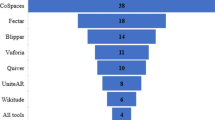Abstract
This study investigated how teachers, who were familiar with AR and implemented AR-based instructional interventions, identify and perceive the factors that affect the integration of AR in educational practice. The research data were collected through online semi-structured interviews from teachers who had previously participated in a professional development program about AR in education. The findings indicated that the participant teachers considered that the use of AR in their instruction can provide many benefits for the students by harnessing a range of affordances that promote active learning. In addition, the findings revealed several factors that affect the integration of AR in primary and secondary classrooms.
Access this chapter
Tax calculation will be finalised at checkout
Purchases are for personal use only
Similar content being viewed by others
References
Akçayır, M., Akçayır, G.: Advantages and challenges associated with augmented reality for education: A systematic review of the literature. Educ. Res. Rev. 20, 1–11 (2017). https://doi.org/10.1016/j.edurev.2016.11.002
Milgram, P., Kishino, F.: A taxonomy of mixed reality visual displays. IEICE Trans. Inf. Syst. 77(12), 1321–1329 (1994). https://cs.gmu.edu/~zduric/cs499/Readings/r76JBo-Milgram_IEICE_1994.pdf
Dunleavy, M., Dede, C., Mitchell, R.: Affordances and limitations of immersive participatory augmented reality simulations for teaching and learning. J. Sci. Educ. Technol. 18(1), 7–22 (2009). https://doi.org/10.1007/s10956-008-9119-1
Sırakaya, M., Sırakaya, D.A.: Augmented reality in STEM education: a systematic review. Interact. Learn. Environ. 30(8), 1556–1569 (2020). https://doi.org/10.1080/10494820.2020.1722713
Kamarainen, A.M., et al.: EcoMOBILE: integrating augmented reality and probeware with environmental education field trips. Comput. Educ. 68, 545–556 (2013). https://doi.org/10.1016/j.compedu.2013.02.018
Salmi, H., Thuneberg, H., Vainikainen, M.P.: Making the invisible observable by Augmented Reality in informal science education context. Int. J. Sci. Educ., Part B 7(3), 253–268 (2017). https://doi.org/10.1080/21548455.2016.1254358
Goff, E.E., Mulvey, K.L., Irvin, M.J., Hartstone-Rose, A.: Applications of augmented reality in informal science learning sites: a review. J. Sci. Educ. Technol. 27(5), 433–447 (2018). https://doi.org/10.1007/s10956-018-9734-4
Pellas, N., Fotaris, P., Kazanidis, I., Wells, D.: Augmenting the learning experience in primary and secondary school education: a systematic review of recent trends in augmented reality game-based learning. Virtual Reality 23(4), 329–346 (2018). https://doi.org/10.1007/s10055-018-0347-2
Arici, F., Yildirim, P., Caliklar, Ş, Yilmaz, R.M.: Research trends in the use of augmented reality in science education: content and bibliometric mapping analysis. Comput. Educ. 142, e103647 (2019). https://doi.org/10.1016/j.compedu.2019.103647
Garzón, J., Acevedo, J.: Meta-analysis of the impact of augmented reality on students’ learning gains. Educ. Res. Rev. 27, 244–260 (2019). https://doi.org/10.1016/j.edurev.2019.04.001
Garzón, J., Baldiris, S., Gutiérrez, J., Pavón, J.: How do pedagogical approaches affect the impact of augmented reality on education? a meta-analysis and research synthesis. Educ. Res. Rev. 31, 100334 (2020). https://doi.org/10.1016/j.edurev.2020.100334
Ibáñez, M.B., Delgado-Kloos, C.: Augmented reality for STEM learning: a systematic review. Comput. Educ. 123, 109–123 (2018). https://doi.org/10.1016/j.compedu.2018.05.002
Chen, P., Liu, X., Cheng, W., Huang, R.: A review of using Augmented Reality in Education from 2011 to 2016. In: Popescu, E., Kinshuk, M.K., Khribi, R.H., Jemni, M., Chen, N.-S., Sampson, D.G. (eds.) Innovations in Smart Learning, pp. 13–18. Springer Singapore, Singapore (2017). https://doi.org/10.1007/978-981-10-2419-1_2
Striuk, A., Rassovytska, M., Shokaliuk, S.: Using Blippar augmented reality browser in the practical training of mechanical engineers. arXiv preprint arXiv:1807.00279 (2018)
Kurniawan, M.H., Witjaksono, G.: Human anatomy learning systems using augmented reality on mobile application. Procedia Comput. Sci. 135, 80–88 (2018). https://doi.org/10.1016/j.procs.2018.08.152
Atwood-Blaine, D., Huffman, D.: Mobile gaming and student interactions in a science center: the future of gaming in science education. Int. J. Sci. Math. Educ. 15(1), 45–65 (2017). https://doi.org/10.1007/s10763-017-9801-y
Mota, J.M., Ruiz-Rube, I., Dodero, J.M., Arnedillo-Sánchez, I.: Augmented reality mobile app development for all. Comput. Electr. Eng. 65, 250–260 (2018). https://doi.org/10.1016/j.compeleceng.2017.08.025
Lytridis, C., Tsinakos, A., Kazanidis, I.: ARTutor - an augmented reality platform for interactive distance learning. Educ. Sci. 8(1), 6 (2018). https://doi.org/10.3390/educsci8010006
Jang, J., Ko, Y., Shin, W.S., Han, I.: Augmented reality and virtual reality for learning: an examination using an extended technology acceptance model. IEEE Access 9, 6798–6809 (2021). https://doi.org/10.1109/ACCESS.2020.3048708
Alalwan, N., Cheng, L., Al-Samarraie, H., Yousef, R., Alzahrani, A.I., Sarsam, S.M.: Challenges and prospects of virtual reality and augmented reality utilization among primary school teachers: a developing country perspective. Stud. Educ. Eval. 66, 100876 (2020). https://doi.org/10.1016/j.stueduc.2020.100876
Radu, I.: Augmented reality in education: a meta-review and cross-media analysis. Pers. Ubiquit. Comput. 18(6), 1533–1543 (2014). https://doi.org/10.1007/s00779-013-0747-y
Chang, S.C., Hwang, G.J.: Impacts of an augmented reality-based flipped learning guiding approach on students’ scientific project performance and perceptions. Comput. Educ. 125, 226–239 (2018). https://doi.org/10.1016/j.compedu.2018.06.007
Arici, F., Yilmaz, R.M., Yilmaz, M.: Affordances of augmented reality technology for science education: Views of secondary school students and science teachers. Hum. Behav. Emerg. Technol. (2021). https://doi.org/10.1002/hbe2.310
Ozdamli, F., Karagozlu, D.: Preschool teachers’ opinions on the use of augmented reality application in preschool science education/Mišljenja nastavnika predškolskog odgoja o upotrebi aplikacije proširene stvarnosti u predškolskom obrazovanju u području prirodnih znanosti. Croat. J. Educ. - Hrvatski Časopis za Odgoj i Obrazovanje 20(1), 43–74 (2018). https://doi.org/10.15516/cje.v20i1.2626
Huang, Y., Li, H., Fong, R.: Using augmented reality in early art education: a case study in Hong Kong kindergarten. Early Child Dev. Care 186(6), 879–894 (2016). https://doi.org/10.1080/03004430.2015.1067888
Banerjee, G., Walunj, S.: Exploring in-service teachers’ acceptance of augmented reality. IEEE Tenth International Conference on Technology for Education T4E, 186–192 (2019). https://doi.org/10.1109/T4E.2019.00043
Creswell, J.W.: Educational Research: Planning, Conducting, and Evaluating Quantitative and Qualitative Research, 4th edn. Pearson Education Inc., Boston, MA (2012)
Author information
Authors and Affiliations
Corresponding author
Editor information
Editors and Affiliations
Rights and permissions
Copyright information
© 2022 The Author(s), under exclusive license to Springer Nature Switzerland AG
About this paper
Cite this paper
Koutromanos, G., Jimoyiannis, A. (2022). Augmented Reality in Education: Exploring Greek Teachers’ Views and Perceptions. In: Reis, A., Barroso, J., Martins, P., Jimoyiannis, A., Huang, R.YM., Henriques, R. (eds) Technology and Innovation in Learning, Teaching and Education. TECH-EDU 2022. Communications in Computer and Information Science, vol 1720. Springer, Cham. https://doi.org/10.1007/978-3-031-22918-3_3
Download citation
DOI: https://doi.org/10.1007/978-3-031-22918-3_3
Published:
Publisher Name: Springer, Cham
Print ISBN: 978-3-031-22917-6
Online ISBN: 978-3-031-22918-3
eBook Packages: Computer ScienceComputer Science (R0)




